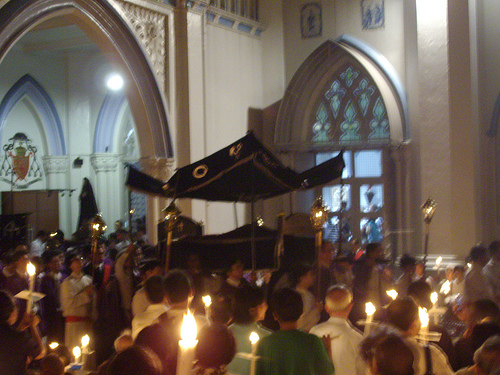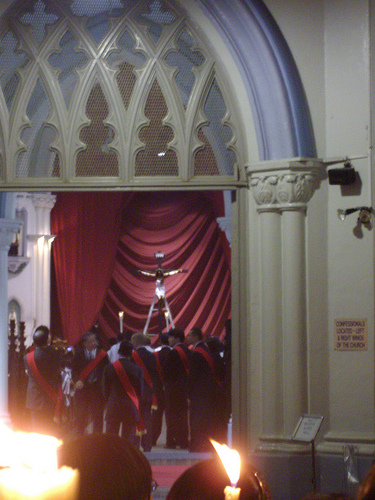Further thoughts from earlier post on rival gospel traditions. . . . .
It is easy to overlook that the gospels of John and Luke say that the Jews themselves, not Roman soldiers, crucified Jesus with Pilate’s permission. This is as is narrated in the Gospel of Peter and elsewhere, as per the above post.
Luke also, like the Gospel of Peter, assigns Herod a leading role in the circumstances of Christ’s death. In the following I’m assuming, as I have presented arguments elsewhere, both a late (second century) date for the gospels, and Luke being the last gospel written (as per Matson, Shellard, et al).
I am exploring here the possibility that while John was strongly influenced by the eastern narratives, it was the author of the Gospel of Luke who, after many who had composed narratives before him, attempted the most “catholic” (albeit anti-Marcionite and anti-Ebionite/Nazarene) gospel. Luke is famous for his introduction in which he declares that “many” have preceded him. This alone points to a late date for the gospel.
If, as per Tyson et al, canonical Luke was composed in the mid second century, it is possible that the Gospel of Peter was known to its author.
John and Luke declare the Jews carried out the crucifixion:
John 19:14-16
And it was the preparation of the passover, and about the sixth hour: and he saith unto the Jews, Behold your King! But they cried out, Away with him, away with him, crucify him. Pilate saith unto them, Shall I crucify your King? The chief priest answered, We have no king but Caesar. Then delivered he him therefore unto them to be crucified. And they took Jesus, and led him away.
(Thanks to Joe Wallack, who in a comment on the earlier post, alerted me to this John passage that prompted the thoughts of this post.)
Luke 23:24-36
And Pilate gave sentence that it should be as they required. And he released unto them him that for sedition and murder was cast into prison, whom they had desired; but he delivered Jesus to their will. And as they led him away, . . . .
Taking this passage in Luke “seriously”, as many like to say, will also prompt us to read more literally the passage in Acts where the Jews are declared to be the ones who crucified Jesus. After all, Acts was very likely written by the same final author of canonical (not the original) Luke (as discussed in my notes on Tyson’s Marcion and Luke-Acts).
Acts 3:13-15
. . . his Son Jesus; whom ye delivered up, and denied him in the presence of Pilate, when he was determined to let him go. But ye denied the Holy One and the Just, and desired a murderer to be granted unto you; and killed the Prince of life . . .
Mark and Matthew say the Romans did it
Of course it is the narratives of Mark and Matthew that have carried the day and through which we too easily read John and Luke. We are also persuaded to read all four gospels through the perspectives of Mark and Matthew because they appear to be comport more closely to what would have been the historical reality of the event — if it were historical.
Mark 15:15-16
And so Pilate, willing to content the people, released Barabbas unto them, and delivered Jesus, when he had scourged him, to be crucified. And the soldiers led him away into the hall, called Praetorium; and they call together the whole band.
Matthew 27:24-27
When Pilate saw that he could prevail nothing, but that rather a tumult was made, he took water, and washed his hands before the multitude, saying, I am innocent of the blood of this just person: see ye to it. Then answered all the people, and said, His blood be on us, and on our children. Then released he Barabbas unto them: and when he had scourged Jesus, he delivered him to be crucified. Then the soldiers of the governor took Jesus into the common hall, and gathered unto him the whole band of soldiers.
The Role of Herod vis a vis Pilate
The Gospel of Peter, and other writings associated more with the eastern Roman empire, agree with John and Luke. But they also say that Herod was the ruler primarily responsible for Christ’s execution.
The earliest gospel, Mark, makes three mentions of Herod or his supporters. Twice Mark speaks of the Pharisees and Herodians colluding to trap Jesus. The first time Jesus escaped their joint plot to kill him, and the last time he outwitted their envoys in a game of riddles:
Mark 3:6
And the Pharisees went forth, and straightway took counsel with the Herodians against him, how they might destroy him.
Mark 12:13
And they send unto him certain of the Pharisees and of the Herodians, to catch him in his words.
In between Herod executed John the Baptist as a foreshadowing of the fate awaiting Jesus, and subsequently confused Jesus for John. (Mark 6
At the end of the gospel when Jesus is on trial the Pharisees and Herodians are nowhere to be seen. Their narrative function has been fulfilled. The climax of the gospel is when the Jerusalem and Roman leaders, the representatives of Jerusalem and Rome, take centre stage.
Matthew has nothing to add to what is written in Mark about Herod’s role.
Mounting anti-semitism
But Matthew does introduce a new anti-semitic twist. In Mark, Pilate relished the chance to please the Jews and deliver Jesus up to be crucified (see Mark 15:15 quoted above). Matthew changes Pilate to a “horribly nice” weakling and coward who declares himself innocent of the blood of Jesus, and who orders Jesus to be crucified (by his own soldiers) simply because he is haplessly intimidated by the loud noises from the crowd and the clenched teeth of their religious leaders. It is the Jews who let Pilate off the hook with “clean hands” by declaring,
His blood be on us, and on our children. (Matthew 27:25)
John’s gospel carries us further into the pit of anti-semitism. Of the Jews Jesus in GJohn says:
Ye are of your father the devil (John 8:44)
John’s gospel regularly identifies the persecutors of Jesus as “the Jews”.
The Gospel of Peter has been interpreted by many as firmly in the same swamp of anti-semitism as John and Matthew. I have prepared a table where one can see easily where and how the Gospel of Peter compares in this and other respects to the canonical gospels. See Gospel of Peter Compared with Canonical Gospels.
Gospel anti-semitism climaxes with Herod replacing Pilate in centre-stage?
At the same time the Gospel of Peter has removed Pilate from centre stage to make room for the Jewish “king”, Herod, to take direct responsibility, with the rest of the Jewish judges and people, for crucifying Christ.
Gospel of Peter, 1:1-2
…but of the Jews no one washed his hands, neither did Herod nor any one of his judges. Since they were [un]willing to wash, Pilate stood up. 2 Then Herod the king orders the Lord to be taken away, saying to them “Do what I commanded you to do to him.”
Enter canonical Luke
Luke’s gospel concedes, with Mark’s, that Herod wanted to kill Jesus. Unlike Mark’s gospel, however, Luke’s gospel portrays an uncowered Jesus who brazenly declares that Herod cannot kill him, at least not for a while.
Luke 13:31-33
The same day there came certain of the Pharisees, saying unto him, Get thee out, and depart hence: for Herod will kill thee. And he said unto them, Go ye, and tell that fox, Behold, I cast out devils, and I do cures to day and to morrow, and the third day I shall be perfected. Nevertheless I must walk to day, and to morrow, and the day following: for it cannot be that a prophet perish out of Jerusalem.
Then, just as in the Gospel of Peter, Luke presents Herod in Jerusalem at the time of the final Passover.
Luke 23:7-12
And as soon as he knew that he belonged unto Herod’s jurisdiction, he sent him to Herod, who himself also was at Jerusalem at that time.
The Gospel of Peter paints a friendly relationship between Pilate and Herod. The disagreement over the justice of killing Jesus was not a big enough obstacle to come between them that way. In GPeter Herod addresses Pilate as “Brother”. Luke’s gospel points to the same relationship unfolding:
Luke 23:12
And the same day Pilate and Herod were made friends together: for before they were at enmity between themselves.
And as per the Gospel of Peter, the Gospel of Luke concurs that Herod at some point not only stood in judgment upon Jesus, but also
Luke 23:8-11
And when Herod saw Jesus, he was exceeding glad: for he was desirous to see him of a long season, because he had heard many things of him; and he hoped to have seen some miracle done by him. Then he questioned with him in many words; but he answered him nothing. And the chief priests and scribes stood and vehemently accused him. And Herod with his men of war set him at nought, and mocked him, and arrayed him in a gorgeous robe, and sent him again to Pilate.
Compare Gospel of Peter 3:1-2 which describes the Jewish soldiers of Herod treating Jesus:
They took out the Lord and kept pushing him along as they ran; and they would say, “Let’s drag the son of God since we have him in our power.” And they threw a purple robe around him and made him sit upon the judgment seat and said, “Judge justly, King of Israel.” . . .
Luke has more to say about Herod’s encounter with Jesus, but unfortunately a corresponding section is missing from the Gospel of Peter.
It seems a nice fit to have the Gospel of Luke at the end of a long trajectory of gospels that
1. began in a Pauline-like gospel with Rome and Jerusalem colluding equally in the murder of the Christ (GMark),
2. reacted with a legalistic bend where Jesus was portrayed as a new Moses, while lurching towards anti-semitism that distanced Pilate from blood-guilt (GMatthew),
3. dived deeper into anti-semitism, while incorporating other aspects of the eastern/Asian Passover tradition, and in particular replacing the Roman executioners with Jewish ones, as per GPeter (GJohn)
(thanks to M. W. Nordbakke for alerting me to the common thread uniting the Gospels of John and Peter here in a comment on the earlier post)
4. Pulled the Roman governor out of the direct line of responsibility altogether by having the Jewish soldiers under Herod’s command, yet retaining a Psalm 2 type collusion between Jewish and gentile rulers (GPeter)
5. Restored Rome’s authority, but still gave the direct Christ-killer role to the Jewish soldiers, and still found room to maintain some of the Herod “tradition”, while also critiquing Matthew’s Mosaic legalistic type of Jesus, and perhaps even finding a place for elements of a birth narrative from the Proto Gospel of James (but that’s all another story) (GLuke).
And I can’t prove a bit of it. At least not yet. But it’s a start for something new to think about. 🙂
Like this:
Like Loading...






